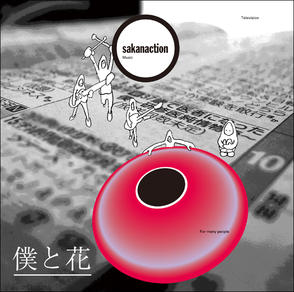| Eve | ||||
|---|---|---|---|---|
 | ||||
| Studio album by | ||||
| Released | March 5, 2008 | |||
| Recorded | 2006–2008 | |||
| Genre | J-pop | |||
| Label | King Records | |||
| Showta chronology | ||||
| ||||
| Singles from Eve | ||||
| ||||
Eve (stylized as EVE) is the debut [lower-alpha 1] studio album of Showta. The album was released on March 5, 2008.
| Eve | ||||
|---|---|---|---|---|
 | ||||
| Studio album by | ||||
| Released | March 5, 2008 | |||
| Recorded | 2006–2008 | |||
| Genre | J-pop | |||
| Label | King Records | |||
| Showta chronology | ||||
| ||||
| Singles from Eve | ||||
| ||||
Eve (stylized as EVE) is the debut [lower-alpha 1] studio album of Showta. The album was released on March 5, 2008.
Eve is the debut studio album of Showta. The album was released on March 5, 2008 under King Records. The limited edition included a DVD consisting of all music videos released from his first five singles. [3]
Showta described the album as having "different voices", mentioning that he sings from different perspectives in each song, including a "pure-hearted young male protagonist" and a woman. [4] He selected Eve as the title as a reference to Adam and Eve, representing how his performances surpassed gender and allowing him to sing from the sound and perspective of a woman. [5]
Aside from containing new original songs, Eve compiles songs from Showta's previous singles released from 2006 to 2008. His debut single, "Negaiboshi", first released on July 26, 2006, [6] was described as being sung from the perspective of a "pure-hearted young male protagonist." [4] Other singles included "Trans-winter (Fuyu no Mukōgawa)", which was used as an insert song to the live-action television adaptation of Damens Walker ; [7] "Hito Shizuku"; "Kimi ni, Kaze ga Fukimasu Yō ni", the ending theme song to Ichiteru!; [8] and a cover of Yoshie Kashiwabara's 1983 song "Haru na no ni." [9]
Along with "Haru na no ni", the album also included cover renditions of other songs, such as Caoli Cano's 1995 song "Gozen Ni-ji no Angel", which Showta's producer had wanted to release after having him do demo recordings of several kayōkyoku songs. [4] "Sausage", which was later re-released as a B-side to Showta's 6th single, "Hikaru no Gen-chan", was described as a "warm R&B song." [10]
The album debuted at #115 in the Oricon Weekly Albums Chart, charting for one week. [11]
CDJournal described the album as having a "healing effect" and felt that Showta's clear voice suited the elegant and acoustic sound, recommending his cover renditions of "Gozen Ni-ji no Angel" and "Ichikōnen." [12]
| No. | Title | Lyrics | Music | Arrangement | Length |
|---|---|---|---|---|---|
| 1. | "Negaiboshi" (願い星lit. Wishing Star) | Masumi Kawamura | Hiroo Yamaguchi |
| |
| 2. | "Gozen Ni-ji no Angel" (午前2時のエンジェルlit. Angel at 2 PM) | Caoli Cano | Caoli Cano | ||
| 3. | "Haru na no ni" (春なのにlit. Even Though It's Spring) | Miyuki Nakajima | Miyuki Nakajima | Masayuki Sakamoto | |
| 4. | "Tameiki Button" (ため息ボタンlit. Sigh Button) | Mikio Sakai | Mikio Sakai | ||
| 5. | "Watashi no Haru ga Hajimaru" (私の春がはじまるlit. Spring Begins For Me) | Ren Takayanagi | Kei Yoshikawa | ||
| 6. | "Yubikiri" (ゆびきりlit. Pinky Promise) | mavie | H-Wonder | ||
| 7. | "Ichikōnen" (一光年lit. One Light Year) | Masumi Kawamura | H.Wonder | ||
| 8. | "Sausage" (ソーセージ) | Jun Ichikawa | Jun Ichikawa | Jun Ichikawa | |
| 9. | "Trans-winter (Fuyu no Mukōgawa)" (Trans-winter 〜冬のむこう側〜lit. Trans-winter (The Other Side of Winter)) | Sonomi Tameoka | Sonomi Tameoka | Daisuke Kahara, REO | |
| 10. | "Kimi ni, Kaze ga Fukimasu You ni" (君に、風が吹きますよlit. May the Wind Blow Towards You) | Gorō Matsui | Akimitsu Honma | CMJK | |
| 11. | "Hito Shizuku" (ひとしずくlit. One Drop) | Taiyō Morito, Juli Shono | Hideya Nakazaki | Hideya Nakazaki | |
| 12. | "Kokuhaku" (告白lit. Confession) | Masumi Kawamura | Oh Seok-jun | ||
| 13. | "Negaiboshi" (Winter Version, bonus track) | Masumi Kawamura | Hiroo Yamaguchi |
| No. | Title | Length |
|---|---|---|
| 1. | "Negaiboshi" (promotional video) | |
| 2. | "Trans-winter (Fuyu no Mukōgawa)" (promotional video) | |
| 3. | "Hito Shizuku" (promotional video) | |
| 4. | "Kimi ni, Kaze ga Fukimasu You ni" (promotional video) | |
| 5. | "Haru na no ni" (promotional video) |
| Chart (2008) | Peak position |
|---|---|
| Oricon Weekly Albums Chart [11] | 115 |

Game is the debut studio album Japanese girl group Perfume. On April 16, 2008, Tokuma Japan Communications released it in both physical and digital formats. Prior to its release, the band was formed in 2000, with early developments including a lineup change, the release of several singles, and other business ventures. After signing with Tokuma in 2005, the band began working with Japanese musician and producer Yasutaka Nakata, who produced, composed, songwriter, recorded assistant, and engineered the entire Game album.

Night Fishing is the second studio album by Japanese band Sakanaction. It was released on January 23, 2008, through Victor Entertainment's BabeStar Label. The album primarily features music written by vocalist Ichiro Yamaguchi since the release of their debut album Go to the Future (2007). Compared to their debut album, which compiled songs that the band had already written, the majority of the songs on Night Fishing were written specifically for the release. The album was an attempt by the band to find a better balance between popular music and underground, and was an album where the members wanted to incorporate more of their own personal styles; which caused the members to disagree over its content much more than on their debut album.

Shin-shiro is the third studio album by Japanese band Sakanaction. It was released on January 21, 2009 through Victor Entertainment. The release was the band's first album after relocating to Tokyo and moving to Victor Entertainment's main roster. Led by the singles "Sen to Rei" and "Native Dancer", the album became the group's first release to chart in the top 10 albums on Oricon's weekly album chart.

"Aruku Around", also known as "A Look Around", is a song by Japanese band Sakanaction. It was initially released as a digital download on January 6, 2010, before a wide release on January 13 as the band's second physical single.

"Identity" is a song by Japanese band Sakanaction. It was released in July and August 2010 as the band's first single after the release of their fourth album Kikuuiki in March 2010. The band's first summer-time release, "Identity" was an upbeat song featuring Latin percussion and lyrics about self-identity. In September 2011, it was added to the band's fifth studio album, Documentaly.

Circus is the debut studio album by Japanese musician and actress Chiaki Kuriyama, which was released on March 16, 2011. Kuriyama collaborated with famous Japanese and overseas rock musicians to create the album. In January 2012, the album was re-released as a deluxe edition, featuring the single "Tsukiyo no Shōzō" and its B-side "Seishun no Matataki""

"Amazuppai Haru ni Sakura Saku" is the first single by Berryz Kobo × Cute, a collaboration unit between the Japanese idol groups Berryz Kobo and Cute. The single was released on November 9, 2011.

"Busu ni Naranai Tetsugaku" is a 2011 song by Hello! Project Mobekimasu. The song is a collaboration between Hello! Project acts Morning Musume, Berryz Kobo, Cute, Erina Mano, and Smileage. The single was released on November 16, 2011 on the label Zetima.

Don't Stop Ai is the sixth studio album by Japanese-American singer-songwriter Ai, released on December 5, 2007, by Island Records and Universal Sigma. It featured two successful singles, the mid-tempo R&B song "I'll Remember You" and the ballad "Taisetsu na Mono," both of which were certified gold by the Recording Industry Association of Japan.

"OSCA" is a song by Japanese rock band Tokyo Jihen, led by musician Ringo Sheena. It was released as the band's fourth single on July 11, 2007, as one of the two singles before the band's third album Variety (2007). It was the first and only single released by the band that did not feature writing by vocalist Sheena, instead created by the band's second guitarist, Ukigumo.

Shin'ya Waku, also known by its English title The Midnight Broadcasting is a compilation album by Japanese rock band Tokyo Jihen, released on August 29, 2012. It predominantly compiled B-sides from the band's singles, as well as a DVD exclusive song and a previously unreleased song, "Tadanaranu Kankei".

Shouta Aoi, is a Japanese singer and actor. Under the stage name Showta, he debuted as a singer with the song "Negaiboshi" in 2006 and released his first studio album, Eve, in 2008. In 2009, he left his agency and briefly released music independently under the pseudonym Noboru Ryugaki.

Unlimited is the debut studio album of Shouta Aoi and his second overall. The album was released on April 22, 2015.

Kikuuiki is the fourth studio album by Japanese band Sakanaction. It was released on March 17, 2010, through Victor Entertainment. In January, the album was preceded by the single "Aruku Around", which was met with the greatest commercial success for the band since their debut, reaching number three on Oricon's singles chart. The album was nominated as one of the finalists for the CD Shop Awards, and was lauded by critics for its cohesive sound and literary lyrics. At the time of release, it was their most commercially successful release since their debut, reaching number three in Japan.

"Boku to Hana" is a song by Japanese band Sakanaction. The theme song for the Tsuyoshi Kusanagi-starring medical drama 37-sai de Isha ni Natta Boku: Kenshui Junjō Monogatari, it was released as a single by the band in May 2012, the first from their sixth album Sakanaction.
The discography of Shouta Aoi consists of three studio albums, one mini-album, two compilation albums, and seventeen singles. In addition to this, Aoi has released music and drama CDs for characters he has voiced as well as contributing to anime and video game soundtracks.
"Haru na no ni" is a song by Japanese singer Yoshie Kashiwabara, released as her 12th single on January 11, 1983.
"Hikaru no Gen-chan" (光のゲンちゃん) is a song by Showta, released as his 6th single on April 23, 2008. The song was featured on NHK's Minna no Uta for the months of April and May 2008 to celebrate the 1000th anniversary of The Tale of Genji.

Showta Best is a compilation album by Showta. The album was released on July 6, 2016.
"Hito Shizuku" is a song by Japanese singer Showta, released as his 3rd single on April 4, 2007.